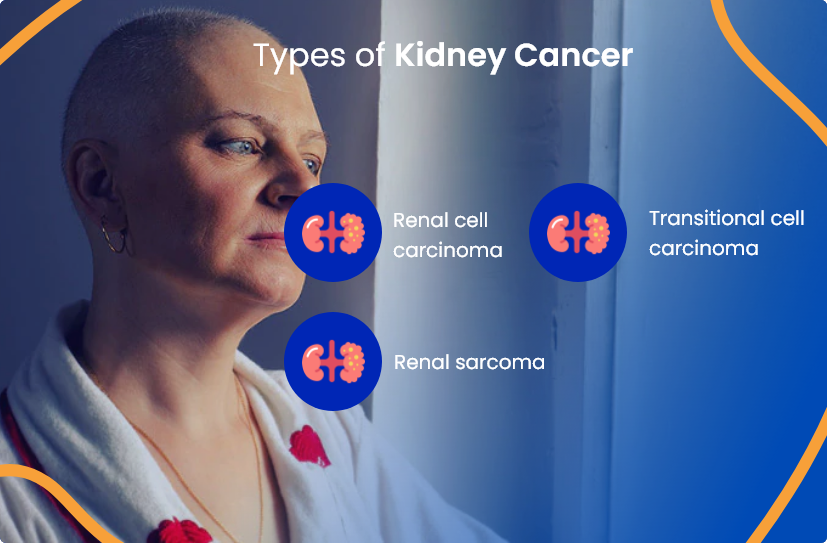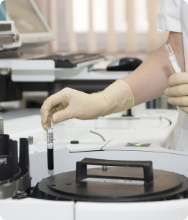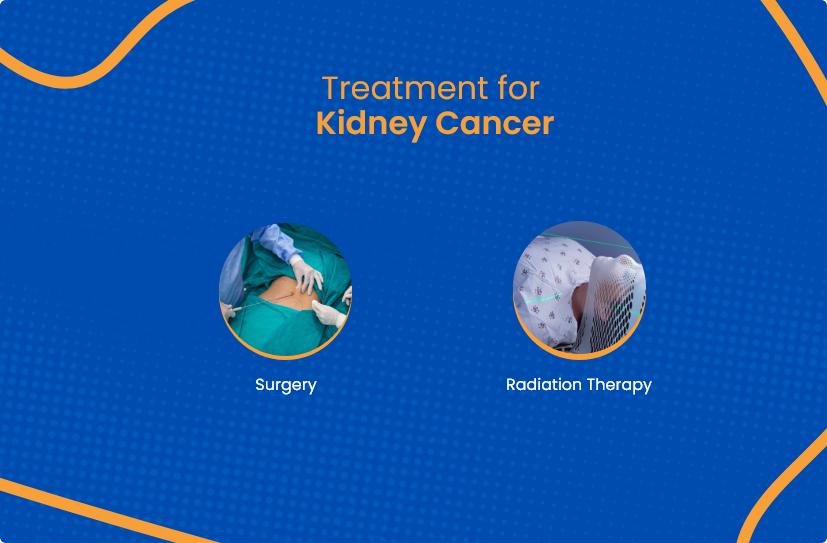
Book a Consultation
Thank you!
Your form has been sent successfully.

Kidney cancer develops when healthy kidney cells mutate (change) and start growing rapidly. As these abnormal cells build up, they form a mass known as a tumor.
Tumors can be benign (not cancerous) or malignant (cancerous), and men are more likely to develop kidney cancer than women. Tumors vary in size and growth rate, influencing treatment options and outcomes

Many kidney tumors are found when still localized (limited) to the kidney. Renal cell carcinoma (RCC) is the most common type of kidney cancer, beginning in the tiny tubes (renal tubules) that process filtered fluid in the kidneys.
RCC has different subtypes, including:
Chromophobe renal cell carcinoma
Clear cell renal cell carcinoma
Collecting duct carcinoma
Medullary carcinoma
Papillary renal cell carcinoma
Less common kidney cancers include renal sarcoma, which starts in blood vessels or connective tissues, and transitional cell carcinoma, found in the lining of the renal pelvis (where urine collects before reaching the bladder)
Early-stage kidney cancer often causes no symptoms. But common signs in later stages include:
Blood in urine
To diagnose kidney cancer, doctors will review your medical history and perform a physical exam, checking for abdominal swelling or lumps.
Diagnostic tests include:
Blood chemistry tests: To check levels of liver enzymes and calcium.

Abdomen and kidney ultrasound: Creates images to show a tumor’s size and shape.

CT or MRI scans: These modern imaging tests clearly show the kidneys and help detect tumors with greater accuracy.

These tests help determine the best approach for your treatment.

Doctors consider your overall health and the specific type of kidney cancer to determine your best treatment plan. Surgery is usually the first line of treatment for kidney cancer.
With surgery, the goal is to remove cancer cells while preserving healthy kidney function as much as possible. It can either be radical or conservative.
Radical nephrectomy: The entire kidney and nearby tissue are removed. Lymph nodes are taken out only if they appear affected.
Partial nephrectomy: Only the tumor and a thin layer of healthy kidney tissue are removed, keeping as much kidney as possible.
In some cases, tumor cells are destroyed by freezing them, a process known as cryosurgery (freezing cancer cells).
Radiation therapy can help shrink or control kidney tumors and relieve pain, often when surgery can’t be done.
The cancer specialists at ACTC in Florida provide exceptional care through personalized, evidence-based treatment plans tailored to each patient’s needs.
We are committed to creating a supportive environment that promotes both physical and emotional well-being throughout every stage of the cancer journey.
Our expert team includes the following providers available for consultation at ACTC:

Hematology/Oncology

Hematology/Oncology

Radiation Oncology
At ACTC in Florida, our cancer experts work alongside a trusted clinical team with decades of experience. From your first diagnosis to follow-up care, we’re here to guide you every step of the way—all under one roof.
Call 352-345-4565 or book an appointment.

If you or your family member has been diagnosed with kidney cancer, an internet search for the best kidney cancer doctor in and around Brooksville may not be the best thing to do. A detailed discussion with your diagnosing physician would help you understand your condition better, and then you can get a referral to an advanced cancer treatment center like ACTC in Florida.
As one of Florida’s leading kidney cancer centers, we understand how the diagnosis and treatment of cancer can impact the emotional and physical state of a patient. As a result, we work hard to ensure patients and their families feel secure. We also understand how important it is for you and your family to make the right choices and play an active part in the recovery process. At ACTC, we seek to provide complete treatment for all types of kidney cancer including screening, diagnosis, staging, treatment, and long-term follow-up, all in one convenient location.
Schedule a consultation by calling
 352-345-4565
352-345-4565
Kidney cancer occurs most commonly in people between 65 and 74 years of age, but it can also develop in younger individuals. Regular check-ups with your doctor can help detect the condition earlier.
Smoking, obesity, and high blood pressure are major risk factors. Quitting smoking lowers your risk.
It usually spreads to the lungs. It can also reach the bones, liver, or brain.
Schedule a consultation by calling
 352-345-4565
352-345-4565